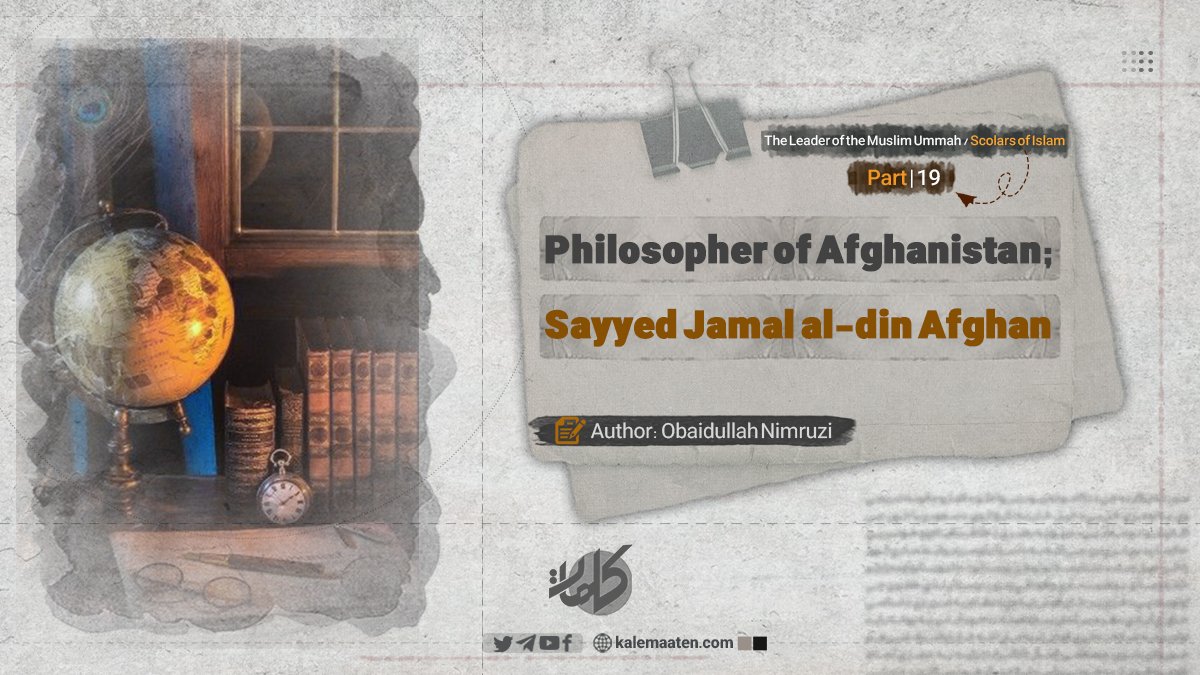
Author: Obaidullah Nimruzi
Philosopher of Afghanistan: Sayyed Jamal al-din Afghan (Part 19)
1. The Historical Mission of Sayyed Jamal al-din Afghani and Its Effects on the History of Islam
The historical mission of Sayyed Jamal al-din Afghani is considered one of the most important factors for change in the contemporary history of the Islamic world. This mission not only affected the intellectual and scientific landscape of the Islamic world but also influenced figures such as Muhammad Abduh in the realm of thought and Sa’ad Zaghloul in the area of political action. Sayyed Jamal al-din was able to provide a suitable platform for religious and social reforms through his innovative ideas. Muhammad Abduh, one of his prominent students, expanded Sayyed’s ideas in the development of religious thought and scientific reforms in Egypt and other parts of the Arab world. Similarly, Sa’ad Zaghloul, a prominent political figure in Egypt, emerged under the influence of Sayyed’s thoughts within national and anti-colonial movements, playing a significant role in his country’s independence and freedom. These two figures exemplify the extensive and profound impact of Sayyed Jamal al-din in the Islamic world. He not only penetrated the intellectual domains of Muslims but also left lasting political and social influences that continue to be evident in contemporary Islamic movements.
2. The Complex Personality and Distinctive Characteristics of Sayyed Jamal al-din Afghan
Sayyed Jamal al-din Afghani’s personality was complex and multidimensional, exhibiting unique characteristics across various aspects of his life. He was a man who harbored opposites within himself. On one hand, he demonstrated tolerance and patience in addressing problems and adversities; on the other hand, he exhibited a sharp and harsh nature in the face of injustices and oppression. The Sayyed was simple and humble among his like-minded peers and comrades but refused to compromise his rights when confronted with arrogant kings and leaders. He consistently showed that he was unafraid of any position or power and would not submit to cruel and corrupt authorities.
At the same time, Sayyed Jamal al-din was a person with a pure and good heart who did not hesitate to defend his beliefs. Throughout his life, he tirelessly sought the truth and spared no effort in its pursuit. These characteristics endeared him to the public. However, they also led to strong opposition against him. His friends and associates emphasized that Sayyed’s insistence on his principles and views sometimes hindered his progress and allowed opponents to exploit potential weaknesses. Particularly during the colonial era, when many Muslims were fearful and hesitant, Sayyed Jamal al-din, with his clarity of expression and unparalleled courage, was able to raise many important issues facing the Islamic world and called for reforms.
3. Courage and Insistence on Principles: Distinctive Characteristics of Sayyed Jamal al-din
One of the most notable characteristics of Sayyed Jamal al-din was his steadfastness in his principles and beliefs. In the face of strong criticism and opposition, he not only refused to yield but also defended his convictions with courage and dignity. Sayyed firmly believed that only through adherence to correct religious and moral principles could profound societal reforms be achieved. He maintained that achieving justice required not hesitating to use any means, even if it involved confronting tyrannical and authoritarian powers. This approach made Sayyed Jamal al-din an influential and undeniable figure in the history of Islamic thought.
Some of his friends and associates have noted that these characteristics sometimes indirectly hindered his further progress. Particularly during his struggle against tyranny and colonialism, this insistence on principles created enemies who used these traits to slander and criticize him. Nevertheless, Sayyed never retreated from his convictions and continually fought to achieve his goals. This dedication made him one of the pioneers of reform movements in the Islamic world.
4. The Religious Call of Sayyed Jamal al-din and Its Effects on Scholars and Opponents
Sayyed Jamal al-din Afghani based his religious call on rational and scientific principles, yet this very call led him to face numerous challenges and controversies. He presented his religious beliefs in a way that elicited intense criticism and scrutiny from opponents and some scholars. Sayyed aimed to interpret religious concepts to align with the scientific and social developments of his time, but these new interpretations provoked resistance from many traditional and conservative scholars, who accused him of deviating from established religious principles.
These controversies and disputes not only impacted Sayyed’s position in religious and scientific circles, but his enemies also exploited these differences to attack him and undermine his standing. In fact, Sayyed Jamal al-din garnered significant attention for his courage and fearlessness in reassessing religious interpretations and criticizing political and social corruption. Unfortunately, these same qualities allowed some opponents to seize every opportunity to discredit his character. However, such challenges did not diminish his influence on Islamic thought and social reform.
Continues…


